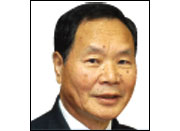
Obama’s Asia policy and Korea
For a first foreign trip after his re-election, President Barack Obama chose Asia last week, starting with Thailand, making a first ever trip to Burma as the U.S. president to go there, and concluding his tour in Cambodia, where he attended the East Asia Summit as part of his effort to rebalance toward Asia-Pacific.
Obama’s Asia trip speaks of the priority he places on the area. The U.S. is a Pacific power. This region accounts for a quarter of the global gross domestic product, which is expected to grow to nearly 30 percent by 2015, and it accounts for 25 percent of U.S. exports, supporting 2.4 million American jobs. In short, U.S. trade and investment will be critical for its economic recovery.
The Obama administration believes that regional security, which continues to serve as “the foundation of the region’s phenomenal economic growth,” requires a stabilizing American presence. For example, the U.S. is committed to carrying out its security obligations to South Korea against the threat of North Korea.
U.S. national security advisor Tom Donilon said before Obama embarked on his Asia trip, “Our overarching objective is to sustain a stable security environment and a regional order rooted in economic openness, peaceful resolution of disputes, democratic governance, and political freedom.”
The rebalancing of U.S. posture toward Asia-Pacific includes an increased projection of military resources in Asia, as Obama declared in Canberra, Australia, last November. It also means strengthening alliances with Japan, South Korea, and Australia, and working with other Asian states, including the Philippines, Thailand, Vietnam, Burma, Mongolia, and India.
Washington also supports the constructive roles of Asian institutions: including the Association of Southeast Asian Nations (ASEAN), the ASEAN Regional Forum, the East Asia Summit, the Shangri La dialogue, and the Asia-Pacific Economic Cooperation (APEC) to address trade and security issues, as they affect U.S. national interest. Obama first attended the East Asia Summit in Bali, Indonesia, last year.
Obama’s security team says that the U.S. rebalancing, which entails reinforcement of its posture in Asia, does not aim to contain the growing China. Washington defines its relationship with China as one of “cooperation and competition.” Washington and Beijing have cooperated on security issues such as North Korea’s and Iran’s missile and nuclear programs.
While increasing the ability to compete with China, the U.S. encourages Beijing to define the goals of its rapidly expanding military capability and to take responsibility to help address regional and global challenges, such as climate change, global economic recovery and free and fair trade, which cannot be resolved without China’s cooperation.
Washington may need to keep a balance between the joint Obama-Hu statement of January 2011 that welcomed China’s peaceful rise and its increased international role and Obama’s Canberra statement that initiated “a pivot to Asia.” The joint statement was conducive to cooperation, while the Canberra statement was viewed as an approach to competition with China.
Obama’s second term is expected to stay the course of “cooperation and competition” pursuing a region where China may keep rising peacefully, where the freedom to sea lanes ― including the Straits of Malacca ― are guaranteed, and where territorial disputes will not undermine regional stability.
China watchers anticipate that the new leadership of Xi Jinping, who has been given control of the Communist Party and the military, and who will replace outgoing President Hu Jintao early next year, will be more focused on domestic reform but mindful of the importance of protecting its territorial claims over the Senkaku/Diaoyu Islands and its rights in the South China Sea.
Although China may not regard the U.S. rebalancing as a threat to its security, many in Beijing believe it is a deliberate U.S. maneuver to encircle and contain it (The People’s Daily, Nov. 23). The mainstream Chinese view accepts the U.S. as a predominant superpower that will last at least for the next 20 years. China will “cooperate and coordinate” with the U.S., as agreed in the May 2012 Strategic and Economic Dialogue.
For the Korean Peninsula, Obama’s second term will probably continue to pursue a strong alliance with Seoul and keep pressing North Korea to denuclearize. Speaking to an audience at Yangon University on Nov. 13, 2012, Obama said, “To the leadership of North Korea, I offered a choice: let go of your nuclear weapons and choose the path of peace and progress. If you do, you will find an extended hand from the United States.”
Neither is China’s policy toward the two Koreas expected to change under Xi Jinping. China will not likely take a new policy that could increase uncertainty and jeopardize the stability on the peninsula. China will continue working with the U.S, although their prioritizing of stability and denuclearization is different.
China will, as it has so far, support the stability of North Korea and it will try to enhance its strategic partnership with South Korea through trade and investment. Like Washington, Beijing is interested in which candidate of the two ― Park Geun-hye of the conservative Saenuri Party or Moon Jae-in, now the unified opposition candidate ― will be elected president on Dec. 19.
China would favor Moon who would be more cooperative with the North than Park, who would be more supportive of the alliance. A Korea Times poll showed more respondents said Moon would manage Seoul’s relationship with China better, while Park would manage the alliance better.
However, both candidates say they would depart from the Lee government’s hard-line North Korea policy. Koreans should start thinking about what they should do, if and when a tipping point does come to change the balance of power between China and the U.S. in 20 or 30 years. What’s your take?
The writer is a research professor of the Ilmin Institute of International Relations at Korea University and a visiting professor at the University of North Korean Studies. He is also an ICAS fellow. Reach him at tong.kim8@yahoo.com. <The Korea Times/Tong Kim>


